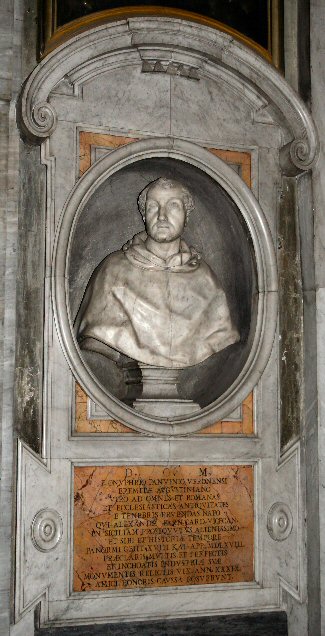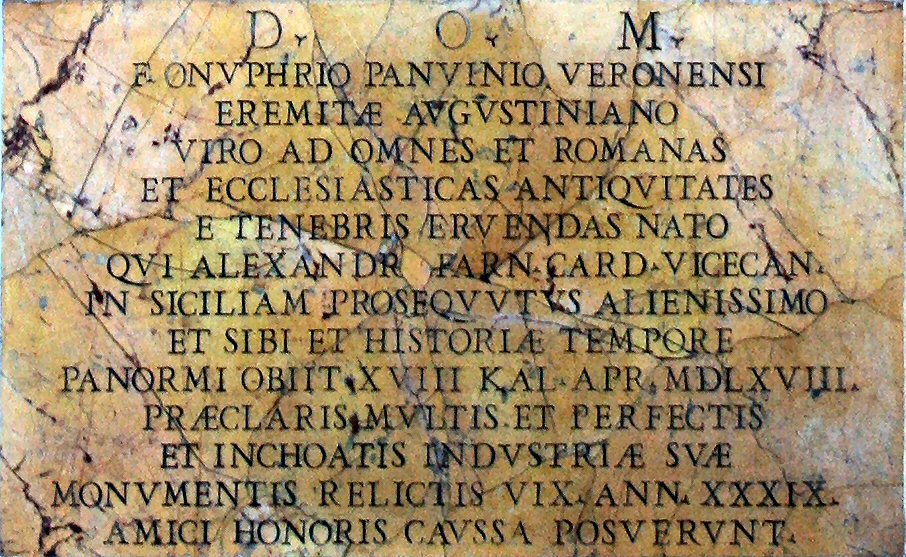 Today is the birthday of Rome!
Today is the birthday of Rome!
Today Rome was (traditionally) founded in 753 BC.
“But Father! But Father!”, I am sure you are about to muse, skeptically. “How could we possibly know that date so exactly? After all, the records aren’t really very helpful, are they””
Peace, O doubters.
Of course the records are sketchy. But once upon a time an Augustinian friar worked all of this out.
I introduce to you the very late Onofrio Panvinio.
In the grand Church of St. Augustine in Rome, not far from the P.za Navonna, the attentive visitor will notice and read the inscription on the tomb of along the right hand wall of the right nave as you face the main altar.
Perhaps when you visit that great church to pray at the tomb of St. Monnica, Augustine’s mother, and to see the Caravaggio and the fresco by Raphael, you will visit the tomb of Onofrio Panvinio (1529 Verona – 1568 Palermo), admire his stony countenance captured in cold marble, and say a prayer for the repose of his soul.
Onofrio was an Augustinian and great scholar. He is the author of such page turners as the 1557 work Fasti et triumphi Rom. a Romulo rege vsque ad Carolum V. Caes. Aug.:Sive epitome regum, consulum, dictatorum, magistror. equitum, tribunorum militum consulari potestate, censorum, impp. & aliorum magistratuum Roman. cum orientalium tum occidentalium, ex antiquitatum monumentis maxima cum fide ac diligentia desumpta. A ripping yarn!
This is the fellow who worked out the date of the founding of Rome, the dates we often see with the abbreviation A.U.C. (Ab Urbe Condita). As you know that condita comes from condo condere cOnditum and not condio condire condItum. If not, we would be saying “From the (year) the City was pickled” rather than “From the (year) the City was founded”. Yep, in Latin it is good to get the accents right.
Here is his monument inscription. Go ahead and take a crack at it!
F. ONVPHRIO PANVINIO VERONENSI
EREMITÆ AVGVSTINIANO
VIRO AD OMNES ET ROMANAS
ET ECCLESIASTICAS ANTIQVITATES
E TENEBRIS ERVENDAS NATO
QVI ALEXANDR FARN. CARD. VICECAN.
IN SICILIAM PROSEQVVTUS ALIENISSIMO
ET SIBI ET HISTORIÆ TEMPORE
PANORMI OBIIT XVIII KAL. APR. MDLXVIII
PRÆCLARIS MVLTIS ET PERFECTIS
ET INCHOATIS INDVSTRIÆ SVÆ
MONVMENTIS RELICTIS VIX. ANN. XXXIX.
AMICI HONORIS CAVSSA POSVERUNT.
Click for a larger image.

So… Buon Compleanno Roma!
And thanks, Onofrio!


































Felicem natalem diem! …Or something to that effect.
Latin fail. D:
And for this Roman, it’s Card. Canizares’ EF Pontifical Mass “al faldistorio” at the Lateran, a quick visit to the Velabrum, the Fora and the Palatinum, and back home (with misty eyes) for minestra di farro, then fave con pecorino and (selected) white Greco di Tufo or Passerina del Frusinate and Gaeta olives. Wife will read excerpts from Livy before the Rosary ad mentem Summi Pontifici. The kids will play Romans and Barbarians but will actually fight over who’s gonna be the defeated and humiliated Vercingetorix. For one day, we’ll play laudatores temporis acti and proud of it!
Ad maiora!
:-))
Maybe it’s just me, but “from the year the City was pickled” has a certain appeal.
This post makes me happy :)
Ad multos et faustissimus annos, Roma Aeterna! Like Michael Hallman, I’m happy about this post! Vivat Urbs Romae, Mater Nostra!
didn’t we know this anyways because the Christmas Martyrology declares it?
Thanks, Father, for the post, and in particular for the lovely inscription. The one thing I don’t get is the XVIII KAL. APR. Um, my inclusive counting ain’t so good, but doesn’t that equal the Ides of March? Meanwhile the Catholic Encyclopedia gives the date 7 April for his death. Huh? Perhaps this has something to do with the mismatch between the Julian and Gregorian calendars? If so, then Onofrio’s amici beat me on the pedantic scale!
Oh, one more thing that’s cool: prosequutus. Never met a perfect active participle I didn’t like.
This is quite rough:
To God, the Best and Greatest.
To Brother (?) Onofrio Panvinio of Verona, Augustinian hermit, a man born to save all antiquities, both Roman and ecclesiastical, from darkness, who, having followed/escorted Alexander Far(nese?), Cardinal Vice-chancellor, in a time (season? weather?) very alien (strange? foreign?) both to himself, and to history, died at Palermo on the seventeenth day before the first of April, 1569, with many illustrious monuments, both completed and begun, of his industry left behind. He lived 39 years. His friends have erected this monument in his honor.
Very interesting in truth…anyone want to buy the candles for the cake??
Very cool. Happy birthday Rome! A day late, but with a good heart. :-)
I SO want to visit Rome someday. I thought when I finished my masters in theological studies–but we are expecting a pair of blessings and it looks like my plans are derailed. LOL!
God bless the Pope and the city of Rome!
Happy Birthday Bella Roma, the most magnificent city I’ve ever visited.
Would it be: Felicem natalem tibi?
Semper Fi!
Happy birthday…a day or two late!
I loved going there-went four times (1977, 1979, 1981, and 1983). I’d love to go back!
As Ann said: God bless the Pope and the City of Rome!
I’d always thought the consensus was the next day, April 21st … which wouldn’t make much of a difference, except that that happens to be my own birthday, and I’m always bragging to people about my sharing a birthday with Rome.
I may have to eat some crow along with my cake today, I suppose …
At any rate, a happy birthday to the Eternal City, belated or not, as the case may be!
Happy Birthday homeland. (At least 75% of my blood is Roman)
Happy bithday homeland
“To God, the best and greatest!
Friends have placed (this memorial) to Brother Onofrio Panvinio of Verona, an Augustinian monk. He was born to bring both church and Roman antiquities from a very different period out of the darkness. He assisted Alexander Cardinal Farnese, once Vice-Chancellor, in Sicily. He died 18 April 1563, at the age of 39. He left behind many illustrious monuments of his work which he had both began and completed.”
Antea linguam latinam unam sententiam anglicam tres loquere dixi.
Tempore Renascentiae, et tempus “alienissimum” antiquae Romae viserunt?
Salutationes omnibus visuris.
Peccavi. Erratum “1563” dicere, corrigendum “1568.”
Otherwise he would lacked time to wrap his “Dictionary of Roman History from Romulus to Emperor Charles V.”
You may have needed it for your Coimbra or Bologna paper on European history.
Regards.
Happy Birthday to a locale that’s been a city, and continuously a city, for 27 centuries! And almost every one of those centuries left something to be seen today.
And everyone on pilgrimage in Rome should go and pray in Sant’Agostino at the tomb of St. Monica. Art lovers also should see the art that Fr. Z mentions, as well as the sculpture of Andrea Sansovino (the Madonna in the narthex) and Caffà’s St Thomas of Villanova, and the painting of Guercino and Lanfranco.
Like pedantic_classicist, I’m puzzled by the date of Br. Onofrio’s death. If we go by the Catholic Encyclopedia’s 7-Apr-1568, that would be “D. Mer. (Wednesday) a.d. VII Id. Apr. A.U.C. MMCCCXXI”. Like p_c, I assumed the a.d. was implied and the date given meant 15-Mar-1568 which should have been “D. Lun. (Monday) Id. Mar. A.U.C. MMCCCXXI”. Was a.d. XVIII KAL. APR. a euphemism used to avoid mentioning the “Ides of March”?
Or was XVIII KAL. APR. the proper way to write 18-April in those days?
Erratum secundum:”loquere”, corrigendum, “loqui.”
Causa patientiae gratias ago.
I agree with those who question the date of death. It can’t be XVIII Kal. Apr. The calendar runs
Idus Martiae, followed by a.d.XVII.Kal.Apr.
You can see the Julian Calendar at http://www.bostonleadershipbuilders.com/0resources/julian_calendar.htm